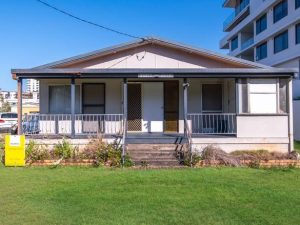What’s behind Geelong’s boom in industrial warehouse construction

The first stage of the Industria precinct in Breakwater has 22 warehouses.
Geelong’s massive population growth has spawned a booming industrial sector amid demand for warehouse space.
The changing shape of our newest suburbs means demand for warehouse and office space in the region’s industrial estates has never been higher.
And property investors and developers have come to the party with a booming construction pipeline.
RELATED: Geelong CBD strategic sites secured for Civic precinct
Buyer splurge pushes Geelong, Surf Coast values
Pako strip welcomes Metro lifestyle

The first stage of the Industria precinct in Breakwater has 22 warehouses.
Projects range from subdividing existing properties to unlocking large tracts of land to build new business parks.
Darcy Jarman, Geelong West agent Tim Darcy said the changing shape of the region’s economy from manufacturing to white collar services preceded the growth in population.
“When you have that level of growth, what happens after the growth in the domestic market is the requirement for ancillary amenities like the retail, commercial and industrial sectors.
“The industrial demand is all coming from warehousing — predominantly from at the small end of the scale but it’s cascading up.”

Warehouses have transformed the landscape in Hede Street, South Geelong.
Mr Darcy said the urban expansion to Geelong’s south has sparked the industrial boom, with 150,000 new residents anticipated by 2036.
But the changing shape of the new suburbs is also driving the industrial sector.
“They’re cottage blocks — they’ve gone away from the conventional blocks that might have been 700 to 800sq m, up to 1000sq m to 1200sq m,” Mr Darcy said.
“So people’s ability to house their trailer, boat or caravan at home becomes increasingly difficult.
“These smaller warehousing is attractive because you can suit various needs and they also suit smaller tradespeople.”
Small businesses were also selecting less conventional locations, incorporating warehousing and free parking into their offices, he said.

A warehouse development under construction in Moon Street, Moolap.
“If you look at the projections and what’s in front of it, it’s only starting.”
The development is concentrated in Geelong’s main industrial precincts — Breakwater, South Geelong, North Geelong and Grovedale, with some work also at Moolap and North Shore.
Areas like Heales Road is better for larger format projects, like logistics and distribution, Mr Darcy said.
Investors in the market can bank on good organic value growth with new industrial land suited to smaller warehouses not expected to become available for at least a decade at Armstrong Creek, he said.
Melbourne developer Wilmac, which has 30 years experience in the industrial and commercial property space, recently entered Geelong with a business park comprising 70 office, warehouse and storage units at Breakwater.
The first stage comprising 22 units has opened at Industria, with construction of stage 2 starting this month.
Wilmac director Chris Wilkins said the premier business park had been well received by the market, with owner-occupiers, investors and tenants securing space.
“We’ve watched this market closely over the past few years and felt the timing was right for us to deliver our trademarked Industria brand,” Mr Wilkins said.
Mr Darcy said owner-occupiers and tenants represent a good cross section of Geelong business at the park, while investors were getting returns up to 6.3 per cent.







